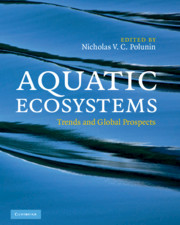Book contents
- Frontmatter
- Contents
- List of contributors
- Preface
- Acknowledgements
- 1 INTRODUCTION: Climate, people, fisheries and aquatic ecosystems
- PART I FLOWING WATERS
- PART II STILL WATERS
- PART III FRESHWATER WETLANDS
- PART IV COASTAL WETLANDS
- PART V ROCKY SHORES
- PART VI SOFT SHORES
- PART VII VAST MARINE SYSTEMS
- PART VIII SYNTHESIS
- References
- Index
Preface
Published online by Cambridge University Press: 04 August 2010
- Frontmatter
- Contents
- List of contributors
- Preface
- Acknowledgements
- 1 INTRODUCTION: Climate, people, fisheries and aquatic ecosystems
- PART I FLOWING WATERS
- PART II STILL WATERS
- PART III FRESHWATER WETLANDS
- PART IV COASTAL WETLANDS
- PART V ROCKY SHORES
- PART VI SOFT SHORES
- PART VII VAST MARINE SYSTEMS
- PART VIII SYNTHESIS
- References
- Index
Summary
Concern about future supplies of fresh water to society, to meet the full range of human needs, now comes very high on the priority list of global societal issues. Water cuts across both ecological and human systems in a way that no other resource other than energy does. It spans from the highest watersheds to the deepest ocean, it has constrained the development of civilizations and continues to limit densities of biota including those of the human species. Water links all the Earth's ecosystems and sustains agriculture, households and industries, in fact most forms of human creativity including art. The future availability of water lies at a moving interface between climate systems, human population size and natural ecosystems, and it begs many questions about how and on what basis conflicting demands of people and nature can be lastingly resolved.
This book has its origins in the Foundation for Environmental Conservation and the International Conferences on Environmental Future which my father (Nicholas Polunin Senior) initiated, the first of the latter pre-dating the original 1972 United Nations Conference on the Human Environment by a year. The specific idea was to bring together many of the best-qualified ecologists to consider at a global level the present and possible future states of all the Earth's aquatic ecosystems. The book is dedicated to Nicholas Polunin Senior and Helen Polunin, who together made it possible, and owes much also to those aquatic ecologists and many others around the world who contributed across the many stages of its development.
- Type
- Chapter
- Information
- Aquatic EcosystemsTrends and Global Prospects, pp. xvPublisher: Cambridge University PressPrint publication year: 2008



